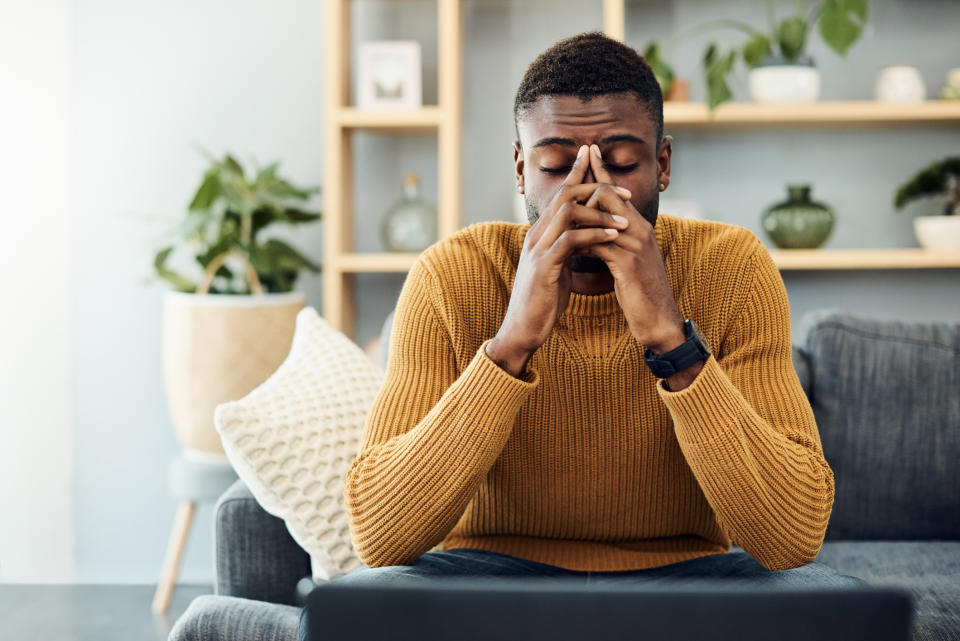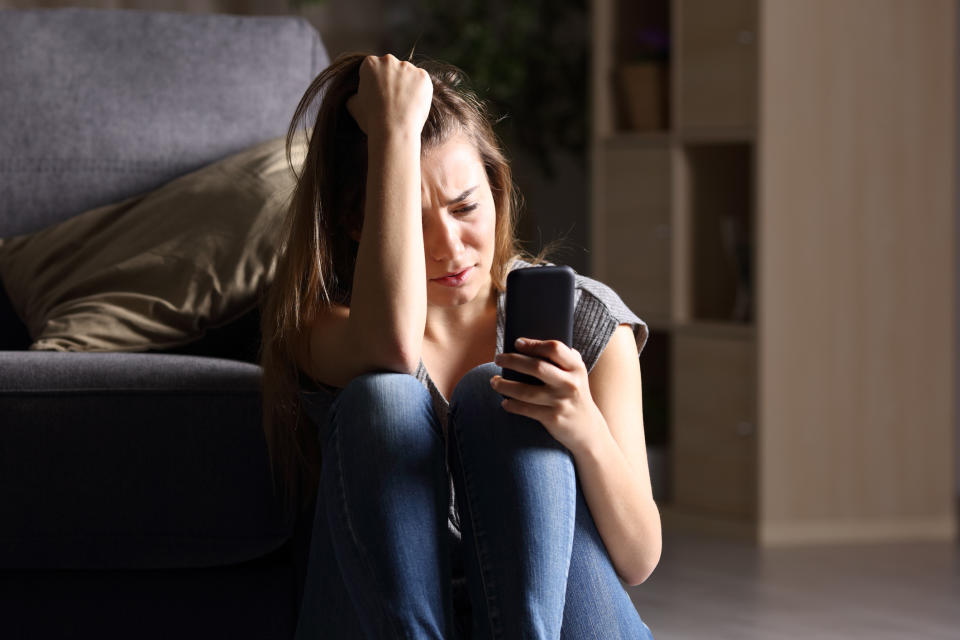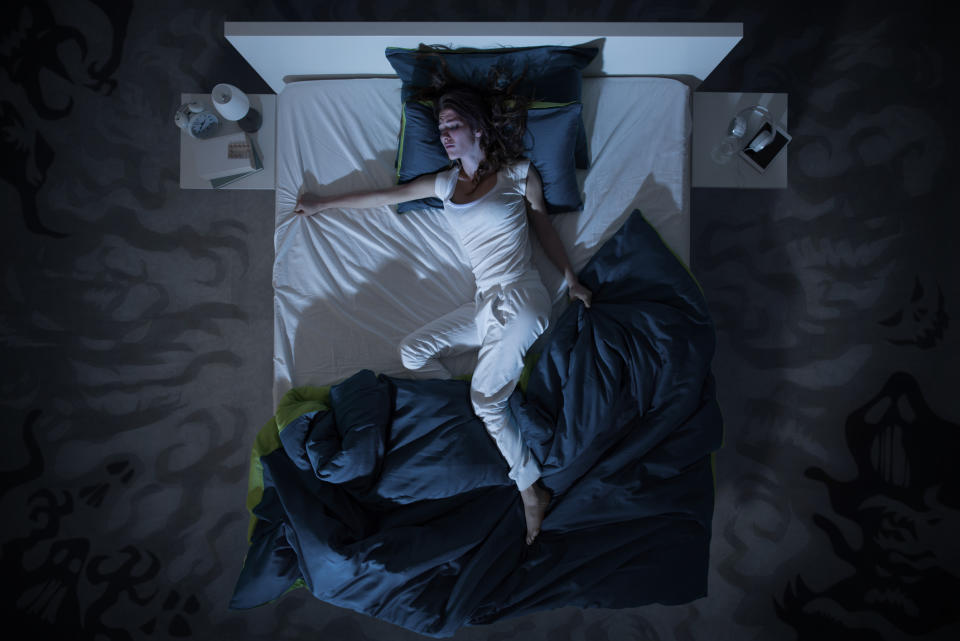Coronavirus: Lack of sleep sees rise in mental health conditions
As the coronavirus pandemic continues to spread and tough lockdown restrictions in Victoria leave millions feeling lonely, depressed or anxious, Beyond Blue is looking to raise awareness about the link between sleep and mental health conditions.
The word 'unprecedented' has been thrown around thousands of times in reference to the pandemic and it's likely that many people have never seen their mental health waver prior to this year, so it's more important than ever before to make sure we're taking the steps to ensure we take care of ourselves.

One of the most effective and proven ways to improve your mental wellbeing is by improving your sleep.
Why sleep is so important for your mental health
Research has proven that people with sleep issues are more likely to develop significant health issues including depression and anxiety.
A.H. Beard’s sleep expert Dr Carmel Harrington, told Yahoo Lifestyle she has seen an increase in people suffering from sleep issues which has affected their mental health. But it also goes the other way where their mental health has affected their sleep.
“It’s a bidirectional relationship," she said, "So, for many years it was always considered, up until about ten years ago, if you have poor mental health, like you have diagnosed depression that you will likely have accompanied sleep issues.”
She added that people who have sleep issues are five times more likely over a period of one to five years of developing depression than those who have no sleep issues.
Speaking of how sleep affects our mental health, Dr Harrington said it's a "multi-pronged effect".
"One of the things that happens when we don’t get enough sleep, it’s very stressful for the body, so we start to produce more cortisol. The more cortisol we produce, the more alert we become and the more stressed we become, because cortisol is normally produced as a consequence of stress – it’s a really good hormone to have, but when we’re just being stressed because we’re not sleeping enough or trying to do too much in one day, then the excess cortisol isn’t great.

“And then we’ll find difficulty getting to sleep and staying asleep and so then the spiral goes down. It has to be understood that what we do when we’re asleep is really important for how we perform, behave and think the next day, because we do very different functions at night when we sleep compared to our brain during the day."
She continued, "One of the things we do [when we're asleep], is we reset our brain and so our emotional centre is very tied up with how well we sleep. People go, ‘When I’m not sleeping well, I’m really cranky or inpatient or disengaged,’ and we don’t really think anything of it, but that’s actually a brain function so we haven’t actually stabilised our emotions.
“So when we start acting more from the emotional centre, then that’s very stressful as well so we start to produce more and more of this hormone that makes us feel stressed and we start to spiral down.”
She then revealed that one study found when we’re tired we are much less likely to remember any positive events from the day and only remember the negative ones.
“And that’s a survival mechanism, because say for example, way back in caveman days, and it was a lovely sunny day and I was picking berries and I ate a red berry that made me sick, I had to remember the red berry made me sick, not that it was a lovely sunny day.

“So what happens when we don’t sleep enough we start to get a very negative attitude towards the world, our joy goes, in the background we’ve got all this cortisol and stress, so it’s not surprising that we end up in a poor mental health state.”
When asked how little sleep one needs to be getting before it can start hindering your mental health, Dr Harrington said, "We consider someone to be sleep deprived if they’re chronically getting one full hour less than they need. So how much you need is somewhere between seven to nine.
"I like sleep, I would sleep eight and a half hours a night, and if I start getting really busy and start getting seven hours, I know within a few days my performance and productivity is going to go down and I’m starting to get annoyed with people and things.
RELATED
Coronavirus: Expert's fears after huge drop in women's checkups
'How much is enough': A mental health guide to watching the news
“But for someone else who only needs say seven and a half, once they’re starting to get six hours, after a few days they’ll start to notice that decrement in performance, productivity, mental health, happiness, joy all those things."
Dr Grant Blashki, a GP and Beyond Blue's Lead Clinical Advisor, also spoke with Yahoo Lifestyle, revealing there had been a 30 to 40 per cent increase in calls to the Beyond Blue support service due to the pandemic.
"We’re definitely seeing a lot more calls, we also set up a coronavirus-specific mental health support line and that’s been really busy. And one thing that’s been really interesting is that three quarters of the calls are coming from Victoria at the moment with the lockdown.
"People are ringing with all sorts of issues, so they’re worried about isolation, loss of jobs, economic issues, conflict at home, anxious about going back to work in some of the places that are opening up."

Dr Blashki said that one of the first things that "comes unstuck" in his patients suffering with mental health issues are their sleep patterns.
"As a GP working in mental health for a couple of decades, I can tell you that one of the first things that comes unstuck when people are having mental health issues is disruption of the normal sleep/wake pattern.
“So, a lot of people will come in in the first instance and say, ‘I’m not sleeping,’ and when you enquire further it may be that they’re worrying a lot during the night, or they might have been having a sleep during the day which has sort of put their cycle out.
“Or they might have been sitting around during the day and not getting much exercise or sun on their face and so their sleep/wake cycle can get quite disrupted and tends to worsen the mental health issues."
How to get your sleep back on track
He added that the first tip he will give to patients struggling with sleep issues, especially during lockdown and they may not have regular work hours anymore, is to have a calendar and write down when you're going to wake up, when you'll get some daily exercise like a walk, and when you'll go to bed.
One of his other recommendations is if you're the type of person who wakes up a lot at night with your mind racing, keep a notepad next to your bed and scribble down what's worrying you and tell yourself that you'll deal with it in the morning.

If you continue tossing and turning, Dr Blashki recommends getting out of bed altogether and sit in another room and do something relaxing until you feel tired.
"What we want to avoid, is that you start associating bed with that sort of stress and ‘Oh my God, I can’t sleep’ thinking. So, really if you can’t sleep, you’re better off to just get up for a little while, just do something quiet in another room until you feel tired," he said.
If you're not getting good sleep, you'll find any mental health issues you're experiencing will be amplified, he added.
“What I find is that lack of sleep tends to amplify the problems of mental health issues like depression and anxiety, so when you haven’t been sleeping, you’re not thinking straight and so you’re more liable to fall into that faulty thinking.
“So, if it’s depression you might be getting into a mess and paying out on yourself or feeling very negative about the world. So, in a sense you don’t have that stamina, that sort of cognitive energy to dispute some of that nasty negative thinking.
“Similarly, I think with anxiety, the same thing, a lot of people will find that lack of sleep is very enmeshed with their anxiety issues, because they’re up a lot in the night, sort of anticipating things, worrying about things."
He added that one tip he will give patients experiencing anxiety is to allocate a worry time, which could be one hour and you use that time to write down everything you're worrying about and try to problem solve in an active way.
“And that sort of background worry that’s going on, when it happens, just say, ‘Listen, I’m dealing with that at 11 o’clock in the morning’, and sort of push it down the road, and that can be quite good for people, because that vague worrying doesn’t solve problems, it’s just tires you out," he said.
Mental health red flags

Dr Blashki shared some triggers we should look out for to indicate our mental health may be declining.
“All of us experience stress throughout our lives, and that’s part of being human, and every now and then people will feel a bit depressed or feel a bit anxious and that’s also part of every day life.
“The sorts of red flags that jump out to me as a GP are mental health symptoms that are interfering with your daily functioning, so making it difficult for you to go to work. Or making it difficult for you to establish relationships or maintain good relationships or if it gets associated with a lot of alcohol or other drug use.
“Or, some people say, ‘I’m managing, but I’m just exhausted, I feel like I’m working really hard just to keep an even keel,’ and sometimes they’re finding themselves just below that threshold of developing a mental health condition," he said.
“There’s also on the Beyond Blue website, some really useful survey questionnaires that you can do and they give you some instant feedback.
“So there’s one on the Beyond Blue website called the K10, and you can do it, and we get tens of thousands of people doing it every month, and it gives you some instant feedback and might say, ‘It looks like you’re in the normal range,’ or, ‘You look like you’re a bit stressed,’ or ‘You look like you’re in a bit of trouble and you should get some more help from your GP or from our Beyond Blue phone service.’”
He added that the Beyond Blue phone service gets about 200,000 calls a year and revealed a new phone line was created in response to the coronavirus pandemic – the phone number for this line is 1800 512 348 and it’s staffed 24 hours a day by mental health professionals. It’s free and you will remain anonymous.
Increase in nightmares during coronavirus pandemic
Maybe you're able to fall asleep, but when you do, you're having nightmares? Don't worry, it's not just you.
A study by the Lyon Neuroscience Research Centre in France found that since the coronavirus pandemic began, there had been an increase of 35 per cent when it came to participants remembering dreams, with respondents reporting they were having 15 per cent more negative dreams than usual.
Dr Harrington said people having more nightmares during the pandemic was "highly reported" and explained why that might be.

"So, of course, everyone dreams, we dream every night and we go through five sleep cycles which last between 90 to 110 minutes and in each of our sleep cycles we do some dreaming. But we do most of our dreaming in the last third of the night.
"And what’s happening now, I do think it’s a matter of anxiety," she said, adding life is very different for many people now.
“It’s in our sleep, and particularly in our dreams, that we bed down learning and memory and all that sort of stuff, so if we go to sleep at night and have these concerns that are hitting us during the day, we will process that information at night.
“And sometimes it can bring up other memories, we cross-fertilise when we sleep and so some dreams can be quite frightening, because another time that you were really anxious might have been a bit of a scary time, so that’s probably why people are having anxious dreams mores.
“One of the ways we can reduce that is to be really relaxed when we go to bed. So have a very strict go to bed routine and maybe do a guided meditation and what you’re trying to do there is really calm the mind down and stop the brain from going boom boom boom boom, and so by the time you’re going to sleep, your mind is in a different mental state. So that will minimise or reduce the nightmarish dreams.”
Sleep is just as important, if not more, than diet and exercise
One thing that both Dr Blashki and Dr Harrington stressed was that sleep is a very important third pillar of health.
Dr Harrington said, "We need to recognise that sleep is important, it’s the third pillar of health, a lot of A-type personalities are very aware of their nutrition and their exercise and they don’t give a second thought to sleep.
"Well, sleep is just as important, I believe it’s actually more important. And if we want to maintain our optimal physical and mental health we need to make time for it.”
“I think, for anyone that’s had any mental health issues, I think they wish they would’ve heard that message a little earlier in life.”
Australian and family owned business A.H. Beard are providing their research, experts and insights to Beyond Blue as well as donating a minimum of $100,000 to Beyond Blue through the sales of their mattress which will help Beyond Blue assist an additional 2000 people.
Click here to sign up to our daily newsletter to get all the latest news and hacks. Or if you have a story tip, email us at lifestyle.tips@verizonmedia.com.

 Yahoo Lifestyle
Yahoo Lifestyle 





